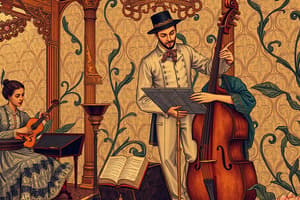Podcast
Questions and Answers
What was the original name given to the area that later became the French Quarter in New Orleans?
What was the original name given to the area that later became the French Quarter in New Orleans?
- Bulbancha (correct)
- Lake Pontchartrain
- Bayou St. John
- Land of Many Tongues
Why was Bulbancha considered an attractive location for settlement according to the text?
Why was Bulbancha considered an attractive location for settlement according to the text?
- Abundance of forests
- Access to the Mississippi River
- Higher ground and convenient access to Lake Pontchartrain (correct)
- Availability of gold deposits
Which tribe mentioned in the text is still striving for federal recognition as of the latest information provided?
Which tribe mentioned in the text is still striving for federal recognition as of the latest information provided?
- Chitimacha
- Houma (correct)
- Coushatta
- Tunica-Biloxi
How did the enslaved Africans and their descendants contribute to the development of New Orleans according to the text?
How did the enslaved Africans and their descendants contribute to the development of New Orleans according to the text?
What vital role did middens play in the selection of the settlement site for New Orleans?
What vital role did middens play in the selection of the settlement site for New Orleans?
During which period did New Orleans become the centre of the domestic slave trade?
During which period did New Orleans become the centre of the domestic slave trade?
Which group of immigrants settled in New Orleans between 1820 and 1860, significantly adding to its population?
Which group of immigrants settled in New Orleans between 1820 and 1860, significantly adding to its population?
What law, under Spanish rule, allowed enslaved individuals to buy their freedom?
What law, under Spanish rule, allowed enslaved individuals to buy their freedom?
Which group of people formed communities in New Orleans built on multigenerational freedom?
Which group of people formed communities in New Orleans built on multigenerational freedom?
Which cultural heritage is New Orleans best known for?
Which cultural heritage is New Orleans best known for?
Flashcards are hidden until you start studying
Study Notes
French Quarter Origins
- Originally named "La Nouvelle-Orléans" by French colonists, which later evolved into the French Quarter.
Attraction of Bulbancha
- Bulbancha, now New Orleans, was favored for its strategic location, fertile land, and proximity to waterways, facilitating trade and agriculture.
Tribe Seeking Federal Recognition
- The Houma tribe is continuing its efforts to gain federal recognition.
Contribution of Enslaved Africans
- Enslaved Africans and their descendants significantly shaped New Orleans through cultural contributions, labor in agriculture, craftsmanship, and the development of unique musical and culinary traditions.
Role of Middens
- Middens, or refuse heaps, provided rich soil and clues about past human activity, influencing the selection of New Orleans as a settlement site due to their archaeological and agricultural value.
Domestic Slave Trade Center
- From the early 19th century until the Civil War, New Orleans emerged as the center of the domestic slave trade in the United States.
Immigrant Population Growth
- A significant influx of Irish immigrants settled in New Orleans between 1820 and 1860, greatly increasing the city's population.
Law Under Spanish Rule
- The Spanish colonial law known as "Manumission" permitted enslaved individuals to purchase their freedom, providing a legal pathway to liberty.
Communities of Multigenerational Freedom
- Free Black communities developed in New Orleans, characterized by multigenerational freedom and a vibrant cultural identity.
Cultural Heritage
- New Orleans is renowned for its unique blend of cultural heritages, notably Creole and Cajun traditions, celebrated through music, cuisine, and festivals.
Studying That Suits You
Use AI to generate personalized quizzes and flashcards to suit your learning preferences.




